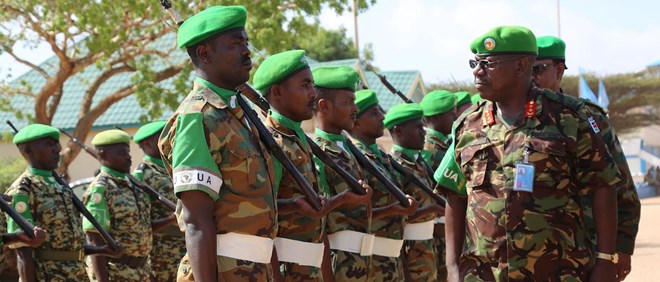By Abdi Ali
Sunday - August 29, 2021

The events in Afghanistan show that no one can defy gravity, demonstrating that lofty ideals and sophisticated military intervention, however well-intentioned, cannot endure past local reality when it hits. This was shown to be particularly true if a country’s leadership does not understand the notion that preserving their country’s future means relying on themselves and putting their people before politics.
What happened in Afghanistan has uncomfortable parallels with Somalia. It is a debate that has taken on new importance, given the role the African Union Mission in Somalia (AMISOM) plays in Somalia’s security. Whilst the observation that there is a danger of Mogadishu’s own potential “Kabul” moment is right, the conclusion that this justifies AMISOM’s continuing stay in Somalia is indeed misleadingly wrong.
What happened in Afghanistan has uncomfortable parallels with Somalia. It is a debate that has taken on new importance, given the role the African Union Mission in Somalia (AMISOM) plays in Somalia’s security. Whilst the observation that there is a danger of Mogadishu’s own potential “Kabul” moment is right, the conclusion that this justifies AMISOM’s continuing stay in Somalia is indeed misleadingly wrong.
The problem starts when illusory stability and squabbling political elite, that feeds on corruption and thrives on misery, is mistaken to be more preferable to the alternative. A by-product of this is the international community’s acquiescence in the weakening of a government’s accountability pillars and turning a blind eye to pervasive corruption – something that is often explained away as being part of a country’s own rugged path to democratic maturity. The consequences are obvious: corrupt leadership; ossified political and economic institutions; popular discontent and security personnel that would moonlight for many sides and melt away at the first sign of trouble.
This is what happened in Afghanistan and mirrors what is happening in Somalia today. Corrupt and weak Somali governments have been sustained by donor cash and foreign bodyguards, sustaining continued acrimony that unravels any progress the country makes. Remove this comfort blanket, the illusory stability crumbles and a stampede to Mogadishu’s Aden Adde Airport is all but certain.
Does this justify AMISOM’s long-term stay in Somalia? Absolutely not.
Does this justify AMISOM’s long-term stay in Somalia? Absolutely not.
The cure that is worse than the disease
AMISOM shares some of the underlying causes of why Somalia is in this mess. Peacekeeping in all its shades is habit-forming. The more a country gets used to the income stream that comes with it, the more the whole endeavour becomes an opportunity for rent-seeking from the continuation of mayhem in the host country. Paradoxically, AMISOM’s income depends on, and is said to be justified by, a weak Somalia that cannot defend itself. The very thing that would address Somalia’s security – effective armed forces – therefore inevitably takes AMISOM out of a lucrative job. Indeed, an obvious contradiction in terms in which Somalia’s national interest takes a backseat.
The fact that neighbouring countries are also part of AMISOM means their presence provides a sort of “strategic depth” in the country to the detriment of Somalia’s sovereignty, security and internal cohesion. Not only are these countries doing their strategic bidding in Somalia, and their baleful influence apparent, but they are also getting paid for it. The answer to the question of AMISOM’s stay in Somalia is therefore blindingly obvious: they should leave.
An AMISOM exit would, at the very least, rectify a debilitating Somali mindset: that Somalis are helpless without external help. It would also provide the political and security reckoning Somalis need to deal with terrorism and their country’s political instability. A president, and political elite, who are guarded by AMISOM have very little incentive to build a viable national army or credible institutions of government. AMISOM’s exit removes this destructive overdependency, ensuring these politicians have a stake in their country’s security situation.
Second, it is much better to reckon with the fact that Somalis need to deal with their own problems now than in another 30 years. Afghanistan is a cautionary tale that shows the dangerous side-effects of overreliance on foreign countries. No level of external intervention can help when the personal interests of a country’s politicians run counter to a country’s future. The solution has to come from the Somalis.
Third, a key lesson from Afghanistan is that the gap between rhetoric and reality is as deep as the ocean floor. Somalia, just as Afghanistan, is a graveyard for grand plans and moonshot ambitions. Somalia’s national development plan runs into hundreds of pages, covering everything from economic growth to security infrastructure; there is security architecture that is long on detail but never meant to be executed; billions of funding that is spent on the country created a monetisation mindset for NGOs and development institutions. It is why the country takes five steps back for every step forward. Rather than narrowly defined goals that deal with the country’s pressing priorities, Somalia is instead overfed with plans that are never owned by Somalis, nor can ever materialise.
Some members of AMISOM have of course done much to support Somalia during a difficult period. However, their time was up long ago and they have now become the cure that is worse than the disease. AMISOM’s presence is also impeding the necessary hard choices Somalis need to make to steer their country’s destiny. Nation-building and fighting for the future of one’s own country cannot be outsourced to others.
The curse of low-expectations – the idea that Somalis are helpless without external help – is as dangerous as it is destructive. It is time to shake off this curse before Mogadishu has a “Kabul” moment.